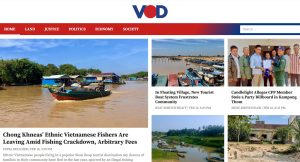Yesterday, I wrote a short article on the closure of one of Cambodia’s few remaining independent media outlets on the order of Prime Minister Hun Sen. Voice of Democracy, commonly known as VOD, ceased its operations yesterday morning after the revocation of its media license, following a report last week about Cambodia’s earthquake aid to Turkey.
Over the past 24 hours, the move has since prompted widespread criticism from Cambodian civil society, the United Nations High Commissioner for Human Rights, and many Western governments, which all issued some variation on the theme that they were “highly concerned” about the closure of VOD (Sweden) and said that they “believed in the free access of information as the basis for free and fair elections” (Germany). (Cambodia is scheduled to hold a national election in July.)
The Cambodian government has characteristically responded to this: by taking refuge in the law, and accusing foreign governments of interference in its internal affairs. In a statement issued late yesterday, the country’s Ministry of Foreign Affairs defended the media outlet’s closure as “an administrative action against a rule-breaking entity,” and asserted that it was consistent with a provision of the country’s press law outlawing the publication of falsehoods about public figures with “malicious intent.”
“A purported ‘free and independent’ press is not a license to break the law with impunity,” it stated. “The move against an unprofessional media outlet does not undermine the vibrant press freedom in the Kingdom, but contributes to the strengthening of the profession of journalism.”
Finally, it claimed that foreign governments’ demands that Cambodia revisit the decision violated the Vienna Convention on Diplomatic Relations, and essentially told Western embassies to butt out of the government’s business.
As I noted yesterday, the proffered justification for the pulling of VOD’s license – that the article had implied that Hun Manet, Hun Sen’s son, had usurped his father’s authority by signing the Turkish aid agreement – falls very far short of being “malicious.” This is all the more true since the article in question quoted a government spokesperson.
Indeed, the sudden move is more accurately viewed as a response to VOD’s hair-raising series of reports about the gargantuan cyber-scam operations that have been run by Chinese organized crime syndicates under the government’s nose (and with the likely involvement of prominent Cambodian businesspeople) in the past few years. It is also largely consistent with a pattern in which the government tightens the bounds of permissible dissent ahead of national elections, in order to guarantee the desired outcome.
Whatever its causes, the swift international reaction to VOD’s closure offers some insights into the dynamic of the relationship between Cambodia and the Western democracies that have funded the country’s reconstruction along democratic lines since the 1990s. Indeed, there has been a certain ritualistic quality in both the earnest (if formulaic) statements issued by foreign governments and the government’s prickly response.
This ritual has played out again and again since a United Nations peacekeeping mission installed Cambodia’s democratic system in the early 1990s. Since then, Hun Sen and his Cambodian People’s Party (CPP) have gradually consolidated control over the country’s political landscape, one concern-prompting action at a time, without eliciting strong or coordinated Western pushback. The CPP now holds all 128 seats in the country’s parliament, controls all of the levers of power, and is a near-certainty to win a lopsided majority at the national election in July. The country’s main opposition party was disbanded more than five years ago.
Whether the current Western criticisms will result in more substantial action remains to be seen. The European Union and United States have already imposed a range of sanctions on the Cambodian government and officials associated with it, motivated in the latter case primarily by the country’s closeness to China. After partially suspending Cambodia’s duty-free access to the European market in 2020, it is conceivable that the move will nudge the EU toward revoking a greater portion of its privileges, especially after July’s electoral charade plays out.
The calculus for the U.S. government is more complicated. Punishing Cambodia for its current crackdown and the upcoming election would have the likely result of reinforcing Hun Sen’s ties to China, which would seem to work against what is now the predominant organizing principle of U.S. foreign policy. While noisy constituencies in the U.S. capitol have called for years for a more punitive American policy towards Hun Sen’s administration, and view his love affair with China as a natural expression of his authoritarian tendencies, three decades of U.S. admonitions and democracy promotion efforts have in fact done much to accelerate the creation of the “ironclad” relationship that now exists between Phnom Penh and Beijing – a dynamic about which Washington policymaking establishment is seemingly becoming more aware. Indeed, Chinese backing gives Hun Sen’s government leeway to extend its crackdowns beyond what was possible when it was more reliant on Western development assistance.
Beyond the narrow question of VOD’s closure, it is hard to say exactly how the balance between the China hawks and the more reflective officials in the U.S. State Department pans out. But the fate of the media outlet and the international response is just the latest indication that China’s economic clout has fundamentally changed Cambodia’s political trajectory. Indeed, it makes it again apparent that the foreign-led democratic transition that began at the end of the Cold War took place within a historical parenthesis that China’s return to wealth and power has now definitively closed.
Perhaps it was no coincidence that Hun Sen last week made a state visit to China, where, as per The Associated Press, he “received multiple assurances of Chinese economic and political support.” China’s Xinhua News Agency quoted President Xi Jinping as saying that his government “firmly supports Cambodia in safeguarding national sovereignty and security, firmly supports Cambodia in steadily advancing major domestic political agendas and economic and social development, and resolutely opposes external forces interfering in Cambodia’s internal affairs.”

































